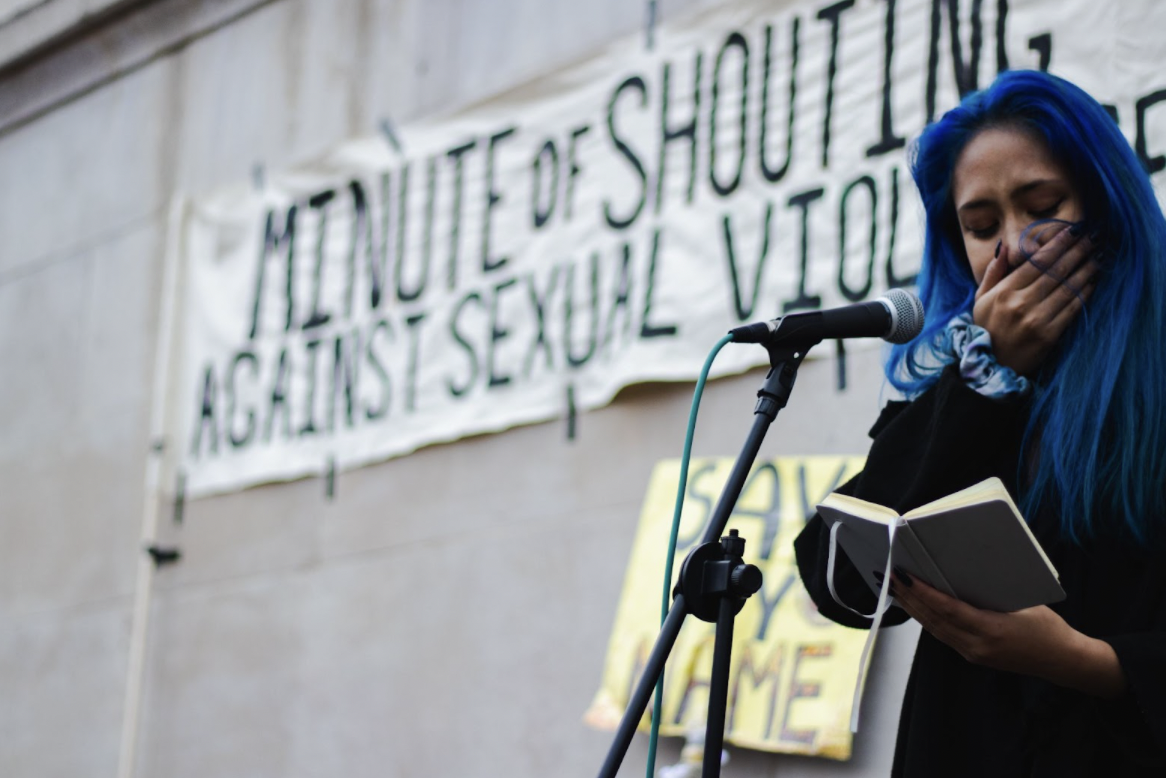End the Silence. End Sexual Violence.

By Zo Wu, BA Global Development and Arabic
Content warning: This article mentions sexual assault and related terms.
The atmosphere of the Trafalgar Square protest, which occurred on a busy Saturday afternoon, was one of bustling tourists and onlookers enjoying the Christmas market. However, not all came to spectate. A large sign reading ‘MINUTE OF SHOUTING AGAINST SEXUAL VIOLENCE’ stood out and seemed to govern the scene. One by one, speakers came up to raise awareness on the topic, sharing astonishing statistics highlighting the grotesque increase of sexual violence in the UK.
“The strength and rage in the speakers’ voices were neither polite nor orderly as they called upon everyone in the square, saying ‘I know you can hear me in your Christmas stalls.’ “
According to the Office of National Statistics (ONS), there was a reported overall fall in crime rates after the pandemic, yet an increase of eight percent in reported sexual offenses. Many brave speakers expressed their frustration and shared their own experiences. The atmospheric emotion and warmth of support was almost palpable on this cold November day. The strength and rage in the speakers’ voices were neither polite nor orderly as they called upon everyone in the square, saying ‘I know you can hear me in your Christmas stalls.’
The commotion created by the organisers echoed the distress and frustration behind the long-overlooked issue of sexual violence. They could no longer be silenced or ignored.
The growing energy boiled over at four o’clock when the shouting began. Strangers, pedestrians, and friends all shouted in unison, expressing fury and resentment for the lack of justice and reform in our society: ‘End the silence, end sexual violence.’
As the new year marked an easing of Covid-19 restrictions, with the increasing social interaction there has been a surge in sexual offences. In nightclubs across the UK, many women have reported being ‘spiked.’ This term refers to the covert drugging of victims with sedative substances like benzodiazepine, commonly utilized to render unsuspecting targets immobilized and vulnerable for assault.
In the past six weeks alone, eleven official reports of spiking are currently being investigated by the Metropolitan Police Service. Cases of spiking via injection have been reported in nightclubs across London, including licensed premises which boast strict searching and security standards. This highlights an alarming failure to react to this recent surge in violence against women.
University students have recently taken matters into their own hands, organizing a broad call to action against spiking through a boycott campaign of nightlife. Titled Girls Night In, this mobilisation called upon university students across the UK to abstain from clubs, bars, and other nightlife activities in efforts to raise awareness about the surge in spiking. They demanded public attention be drawn to the safety and wellbeing of those targeted by these acts of violence.
In addition to the call to action, a public petition calling for the reopening of the night tube has garnered over 125,000 signatures. Those in support of this have highlighted how increased transportation options for women greatly increases safety and mobility, which are currently limited due to pandemic-related closures. Accessibility is critical for the safety of women, and as taxi and ride sharing services surge in price, the impact on those most vulnerable, such as the working class, is compounded. Though TfL have responded with the limited reopening of certain lines during weekends, critics argue this is not enough to create a climate of safety for night-goers.
Sexual violence remains an enduring yet consistently overlooked issue in society today. Efforts from those like the organisers of the Trafalgar Square rally and the Girls Night In boycott movement have commanded public attention and have effectively forced a reckoning in the nightlife industry and beyond. However, the rise in sexual offence reports has made it clear that continuous efforts are essential.
This article discusses content that some readers may find distressing. We have included a list of recourses that may be helpful to our readers: the Student’s Union offer specialist support contact information on the SU website: https://soasunion.org/support/personal/
Outside of SOAS: Survivors Network telephone helpline (Open Mon 7-9 PM & Wed 12-2 PM) 01273 720 110; Rape Crisis UK telephone line (Open every day 12:00-2:30 PM and 7:00-9:30 PM including public holidays) 0808 802 9999, they also have a live chat function on their website (www.rapecrisis.org.uk); Survivors Network also have an online chat, text and call service (Open Mon – Sun, 12pm-8pm) accessible on their website (www.survivorsuk.org); Samaritans have a free telephone line open 24 hours every day of the year at 116 123.
Photo Caption: Speaker at the Trafalgar Square protest (Credit: Zo Wu).



